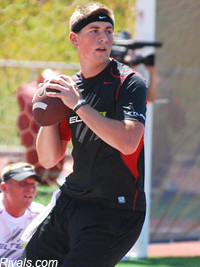Purdues task: Secure home base

Danny Hope's lack of on-field success during his four-year tenure at Purdue resulted in the school dismissing him as head coach on Sunday. There will be many reasons discussed in the coming days for Hope's lackluster 22-27 record at Purdue, and one that can, and likely will, be cited is the inability to keep the roster stocked with top talent.
Advertisement
In the three full classes that Hope recruited to Purdue from 2010 to 2012, the Boilermakers had an average ranking of 60th nationally. They had the No. 69 class in 2013 going when Hope was dismissed.
Interestingly, though, Purdue took an innovative approach to recruiting under Hope, and its lack of success was not because of a lack of effort. It is one of a handful of Big Ten programs that designates an administrative position to coordinate recruiting. Longtime recruiting assistant Paul Gonnella was hired to fill that role in 2011, and he was succeeded by Kevin Maurice in May when Gonnella left for the same role at Alabama.
While the effort and resources dedicated to recruiting were in place under Hope, the focus was lacking and the Boilermakers' classes were an eclectic mix of prospects from across the country.
In fact, in the class of 2012, 16 states were represented among Purdue's 26 signees. The amount of organization and effort it took to pull together a class comprised of prospects from 16 states is extraordinary, but it does not necessarily translate into wins on the field. Of those 26 commits, none was ranked in the top 10 of Purdue's home state of Indiana.
"The importance of securing your home state and your home region in recruiting cannot be overstated," Midwest recruiting analyst Josh Helmholdt said. "These are the kids that understand your tradition, who feel the duty to represent the state, represent their hometowns, when they put on your jersey.
"You also are going to compete better for the same talent in your own backyard than you are in Florida or Texas or California. You are not going to beat the local schools for the best kids in those regions with any regularity, but you should be able to compete with any team that comes into your home state to recruit the top talent."
Gary (Ind.) West Side head coach Jason Johnson noticed the lack of focus on in-state recruiting under Hope. West Side has not been a traditional producer of Division I talent, but it has one of the state's top five prospects in the 2014 class in athlete Lonnie Johnson and several more underclassmen who are generating college attention.
In the short time that Jason Johnson has seen his players get recruited by top Division I programs, Purdue has not been a major factor. He is not hearing the interest in the home-state school from his players.
"Maybe in the middle of the state they might have a different (perspective), but from the northern part the vibe is not positive," Johnson said of Purdue. "They are not that program, and they should be.
"It just seemed like the confidence was down. They need to come in like 'We're Purdue.' They should be 'How dare another program come to our state and talk to our kids?' Other schools come in and don't even mention those schools.
"From my observations of some of the other programs we have been involved with, they seem to think that their No. 1 priority is in-state. I don't really get the feel that that is the motto from Purdue. I look at the schools that are recruiting my two kids, and (Purdue) is not really in the fight."
For a number of years, Purdue was the big team in-state. In the class of 2005, it signed eight of the state's top 10 players. In 2004, it was six of Indiana's top 10 players. Many of those players -- including Curtis Painter, Bernard Pollard, Ryan Kerrigan and Anthony Spencer -- went on to lead Purdue teams and eventually carve a path to the NFL.
Just two of Purdue's 12 commits in the 2013 class hail from Indiana, including Rivals250 quarterback Danny Etling. Etling had a strong connection to the program through his cousin, former Boilermaker Joe Holland, and grew up following the team.
St. John (Ind.) Lake Central junior defensive end Gelen Robinson also has connections to Purdue. His father is former Boilermakers hoops great Glenn "Big Dog" Robinson, and the younger Robinson has followed Purdue football since his youth. With his college recruitment starting to pick up, Robinson said that putting a good product on the field will help attract the top players in-state and from around the country.
"For them to be looked at more by us, the main thing they need to do is start putting some wins up there," Robinson said. "I wouldn't say they are not an interest to recruits, because they are still a Big Ten program. They obviously have a good academic program and they do focus on that, which is a really good thing."
Prospects like Etling and Robinson could become fewer in the years ahead unless the next coach at Purdue can re-establish the Boilermakers' swagger in-state. Winning games certainly brings in more talent, and crafting a sound game plan that includes a strong base of in-state prospects and then picking off as much top talent in other regions as you can has proved to be a successful formula.
Few teams can go into any region of the country and compete for the top kids in those areas, and Purdue is simply not one of those teams right now. The state of Indiana has seen a resurgence in talent over the last few classes, however, and it has seven players rated four-stars or better in 2013.
The prospects who can best help the Purdue program get back on a winning track are in its own backyard.

Click Here to view this Link.
[rl]